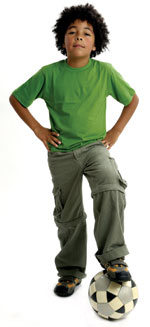 Mike Kendall believes that daughter Cassidy's first basketball coach is much better than her brother Joey's first coach. That guy, Mike Kendall says, had a lot to learn.
Mike Kendall believes that daughter Cassidy's first basketball coach is much better than her brother Joey's first coach. That guy, Mike Kendall says, had a lot to learn.
Kendall ought to know. He's that guy.
Kendall freely admits that he made one of the biggest -- and most common -- mistakes committed by a parent in becoming a coach for his or her child's sports team. He was tougher, by far, on his son than on any of the boy's teammates.
"I expected perfection," says Kendall, a northeast Tacoma resident. "I would get on my son hard during practice and games. Finally, my wife said, 'Hey, there's going to be a point where he isn't going to want to play.' I had to find a balance, and it took me a long time."
Kendall started coaching Joey, now 11, in the first grade. Two years ago, he began coaching Cassidy, now 8. "I learned my lesson the hard way through Joey because I'm a lot more patient and try to treat my daughter like the rest of the kids," he says.
Parents who coach sports perform a valuable service: Most sports leagues wouldn't exist if parents didn't volunteer. "Often they become a sports coach by necessity," says Frank Smoll, Ph.D., a University of Washington professor of psychology who specializes in youth sports.
Yet there's more to the experience than meeting a need, Smoll says. Coaching sports enables parents to solidify the parent-child bond, cultivate a shared interest and shape the development of their child in positive ways, he says.
Bellevue mom Laine Seeley coaches her 8-year-old son, Henry Robert, in baseball and basketball and 6-year-old daughter, Kathryn Robert, in basketball. "It is so rewarding... and for the age they are, I have the skills to help them," she says.
Requisite coaching skills come in two categories -- knowing the game and knowing how to teach it. An increasing number of youth sports organizations are requiring their coaches to attend workshops, but it's not to learn about sport technicalities like zone defense. Instead, the lesson is how to provide a positive and productive coaching experience, Smoll says.
"You don't measure the quality of a youth coach by his or her win-loss record," Smoll says. "You measure them by the type of experience they're providing for youngsters on a developmental basis."
Smoll and fellow UW psychology professor Ronald Smith, Ph.D., are the co-authors of two books, Sports and Your Child: Developing Champions in Sports and in Life and Coaches Who Never Lose: Making Sure Athletes Win, No Matter What the Score.
"Just because you're a good parent doesn't mean you're going to be a good coach/parent," Smoll says. "It's different. You have to be prepared."
Preparation makes sense for any coach, but it is especially important if you will be coaching your own child on the sports team. "You have to set the stage and ask them how they feel about you being the coach," Smoll says. If a child is dead set against it, the parent should reconsider coaching and perhaps take a lesser role as a sports team manager or scorekeeper.
Parents who do opt to coach sports must walk a fine line regarding favoritism. Wanting to appear impartial, parent coaches often demand much more of their own child. "You have to be fair, but being fair doesn't mean being harder on your own child," Smoll says.
According to Smoll, children tend to welcome their parents as coaches when they're younger, but as they approach their teens, they begin to balk. "You have to make sure it's something your kid is comfortable with," says Tom Ellis of Bellevue, who began coaching his son Dan's basketball team when Dan was 7.
Tom had a positive coaching experience until two seasons ago when Dan, now 14, told his dad he didn't want him to coach anymore. "It was the classic teenage, 'Parents doing things with me? How embarrassing!'" says Ellis, who honored his son's request. "I had figured it might be the last year."
However, Dan and his teammates later asked Ellis to rejoin the team as an assistant coach because they missed playing for him. While that prompted Ellis to return as a head coach the following season, he's making no assumptions about next year. "I'll ask Dan again, and if he wants me to, I'll do it," he says.
Even if children want their moms or dads to coach them forever, Smoll advises against it. "You shouldn't be coaching your child for more than two or three years at a time because kids need to learn to adjust to other leadership styles," he says.
Experts and veteran parent-coaches agree that the parental role changes during practice and games. Lynnwood dad Scott Gaskin stresses that issue with his two sons, 9-year-old Myles and 12-year-old Ivan. "We talk about that openly," says Gaskin, who coaches his sons' basketball and soccer teams. "If the coach's kid doesn't show respect, how is anybody else going to show respect?"
Children of coaches must also learn to do something that can be even harder than being respectful: share their parents with the team. "Your kids are used to you being their champion and now you're being supportive of nine other kids," Seeley says. "I tell my kids that once the game starts, I'm your coach, not your mom."
Brad Broberg is a freelance writer and former newspaper reporter and editor who lives in Federal Way with his 12-year-old daughter, Rachel.
Parent coaching resources:
- Warde Publishers: Provides coaching education books and materials for coaches at all levels of competition. Publisher of Sports and Your Child: Developing Champions in Sports and in Life and Coaches Who Never Lose, both co-written by University of Washington professors Frank Smoll, Ph.D. and Ronald Smith, Ph.D.
- Parenting Athletes for Lifelong Success: Web site of sports parenting coach Pam Champagne, columnist for the Washington State Youth Soccer Association newsletter.
- Parenting Young Athletes The Ripken Way, written by former star baseball player Cal Ripken, Jr. with the help of sports psychologist Rick Wolfe, the book looks at youth sports from a parent's perspective.











